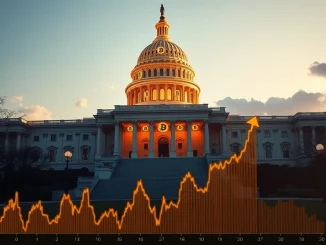
Hold onto your hats, crypto enthusiasts! Peter Schiff, the well-known economist and staunch Bitcoin critic, is back in the spotlight, and he’s not holding back his punches. He’s calling out the popular narrative of Bitcoin as ‘digital gold’ as a complete fraud! In a recent X podcast, Schiff didn’t mince words, labeling Bitcoin as nothing more than a high-risk asset, far from the safe-haven status its proponents often claim. Let’s dive deep into Schiff’s fiery critique and understand why he believes the digital gold dream is nothing but a mirage.
Is Bitcoin Really ‘Digital Gold’ or Just a High-Risk Asset?
For years, the crypto community has championed Bitcoin as ‘digital gold,’ a modern-day equivalent to the precious metal, offering a hedge against inflation and economic uncertainty. But Peter Schiff isn’t buying it. He argues that this ‘digital gold‘ marketing is a deceptive tactic. According to Schiff, while gold has historically served as a store of value and a safe haven during economic turmoil, Bitcoin behaves entirely differently.
Here’s a breakdown of Schiff’s core arguments against the ‘digital gold‘ comparison:
- Volatility vs. Stability: Gold is known for its relative price stability, especially during market downturns. Bitcoin, on the other hand, is notorious for its extreme price swings. Schiff points out that this volatility makes Bitcoin unsuitable as a safe haven asset like gold.
- Tangible vs. Intangible Value: Gold has intrinsic value due to its use in jewelry, electronics, and as a reserve asset for central banks. Schiff contends that Bitcoin lacks such tangible use cases, making its value purely speculative.
- Market Behavior: Schiff highlights that gold often moves inversely to risky assets like stocks during times of crisis. However, Bitcoin tends to correlate with tech stocks and other risky assets, undermining its claim as a safe haven or ‘digital gold‘.
In essence, Schiff believes that while Bitcoin might be marketed as ‘digital gold‘, its actual trading behavior and characteristics are far removed from those of a precious metal. He sees it as a speculative investment, riding the waves of market sentiment rather than acting as a reliable store of value.
Peter Schiff’s Perspective on Bitcoin as a High-Risk Asset
Schiff doesn’t just dismiss the ‘digital gold‘ narrative; he actively categorizes Bitcoin as a high-risk asset. But what makes him so convinced of this? He contrasts Bitcoin with tech stocks, acknowledging that tech companies offer the potential for future earnings and business growth. However, he argues that Bitcoin lacks a clear, fundamental use case to justify its value.
Let’s delve deeper into why Schiff views Bitcoin as a high-risk asset:
- Lack of Intrinsic Value: Schiff reiterates his belief that Bitcoin’s value is purely based on speculation and hype, not on any inherent utility or underlying asset. This makes it inherently risky, as its price is susceptible to drastic corrections based on market sentiment shifts.
- No Real-World Backing: Unlike traditional assets backed by governments, commodities, or company earnings, Bitcoin exists solely as a digital entity. Schiff argues this lack of real-world backing amplifies its risk profile.
- Regulatory Uncertainty: The regulatory landscape for cryptocurrency is still evolving globally. Schiff believes that increased regulation could negatively impact Bitcoin’s price and adoption, adding another layer of risk.
- Market Manipulation Concerns: The relatively nascent and less regulated nature of the cryptocurrency market makes it potentially vulnerable to manipulation, further contributing to its high-risk classification in Schiff’s view.
Schiff emphasizes that while some may see Bitcoin’s rapid price appreciation as a sign of its potential, he views it as a bubble fueled by hype and speculation. He cautions investors to be wary of the significant risks associated with investing in what he considers a fundamentally flawed asset.
MicroStrategy’s Bitcoin Bet: A Path to Bankruptcy?
Peter Schiff’s criticism extends beyond just the asset itself; he also takes aim at companies heavily invested in Bitcoin. His prime target is MicroStrategy (now Strategy), the largest corporate holder of Bitcoin. With a staggering 531,644 BTC in its treasury, MicroStrategy’s fate is closely tied to Bitcoin’s price movements. Schiff predicts that this massive exposure could lead to the company’s bankruptcy.
Why does Schiff foresee bankruptcy for MicroStrategy? His reasoning centers on the following points:
- Overexposure to Volatility: MicroStrategy’s substantial Bitcoin holdings make it extremely vulnerable to Bitcoin’s price volatility. A significant Bitcoin price crash could severely impact the company’s balance sheet and financial stability.
- Debt Burden: MicroStrategy has reportedly financed some of its Bitcoin purchases through debt. A prolonged bear market in Bitcoin could make it difficult for the company to service its debt obligations, increasing the risk of financial distress.
- Business Model Dependency: While MicroStrategy initially was a software company, its identity has become increasingly intertwined with Bitcoin. Schiff argues that this over-reliance on a volatile asset for its financial strategy is a dangerous gamble.
Schiff’s prediction of MicroStrategy’s bankruptcy is a stark warning against the risks of corporations heavily investing in cryptocurrency. He sees it as a case study of the potential pitfalls of embracing Bitcoin as a core part of a company’s financial strategy, especially when the asset is, in his view, fundamentally overvalued and high-risk.
The Ongoing Bitcoin Debate: Skepticism vs. Belief
Peter Schiff’s views represent a strong voice of skepticism in the ongoing debate about Bitcoin and its role in the financial world. While he sees it as a fraudulently marketed, high-risk asset destined for failure, many others champion Bitcoin as a revolutionary technology and a store of value for the future.
The reality is likely somewhere in between. Bitcoin, while exhibiting volatility and facing regulatory uncertainties, has also shown resilience and garnered increasing adoption. Whether it truly becomes ‘digital gold‘ remains to be seen, but the debate sparked by critics like Peter Schiff is crucial for a balanced understanding of Bitcoin’s potential and inherent risks.
Ultimately, Schiff’s commentary serves as a warning to investors to approach Bitcoin and the broader cryptocurrency market with caution, emphasizing the importance of understanding the risks involved and not blindly following hype or narratives, especially the enticing, yet in his opinion, misleading ‘digital gold‘ claim.



